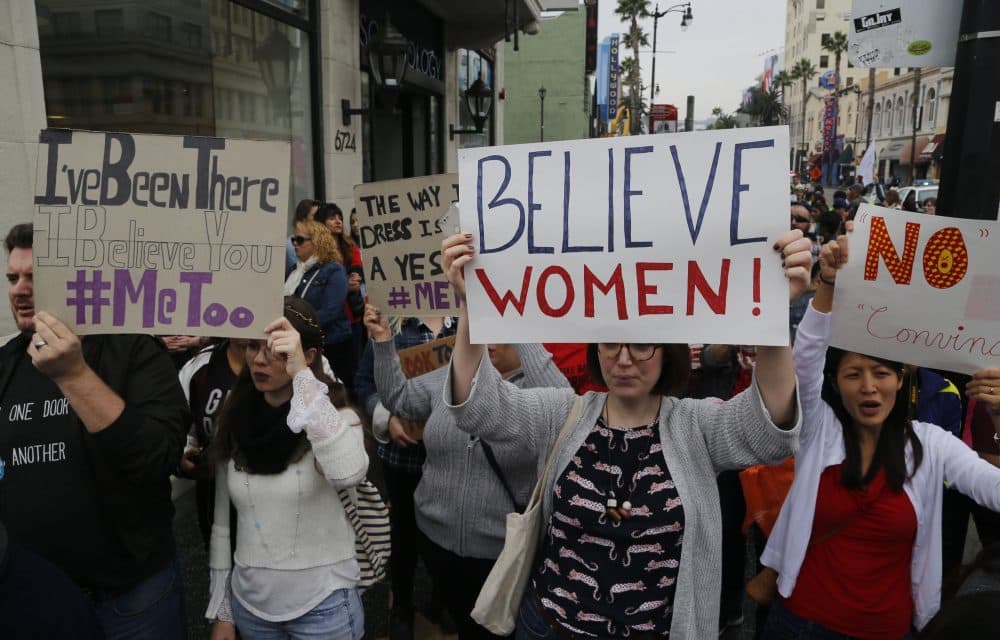Advertisement
Commentary
The Macho Individualism That Gave Rise To #MeToo

Last week, Time magazine honored as its Person of the Year women who have been standing up to sexual assault. But the #MeToo Movement is a symbol of something much greater than opposition to criminal behavior. It is a way to put a name to a sea change in America. Women are reclaiming the nation from the radical individualism that has dominated it since the 1980s. We are finally demanding that the country acknowledge the extraordinary damage caused by the image of successful man as macho cowboy.
When I was a kid, women had increasingly important roles in the public conversation. I grew up watching Barbara Walters anchor the evening news, and saw Katharine Graham bedevil President Nixon from her position as the publisher of the Washington Post. I heard of Maine Senator Margaret Chase Smith standing up in a Senate full of cowed men to attack Joe McCarthy while he sat sneering two rows behind her. I admired Representative Shirley Chisholm's visit to the wounded George Wallace, even though I didn't understand how she could stomach it. And Representative Barbara Jordan's principled speech about Nixon and the sacredness of our constitutional system sent chills down my spine even as an 11-year-old.
My friends and I didn't miss the growing power of women: even as children, we talked a lot about where the future might take us. When I went off to an elite New England prep school that had only recently begun to admit women, there was no doubt in my mind that my voice was equal to those of the boys around me, even when I was the only girl in the classroom.
But something funny happened.
People started to say that women who wanted equal rights were shrill harpies who wanted the government to give them advantages no one else had. They were in your face, constantly complaining. Rumors started that they had burned their bras at the 1968 Miss America pageant, and they wanted abortions on demand because they could not conceive of anything more important than their own freedom.
Congress passed an amendment to the Constitution saying that "Equality of rights under the law shall not be denied or abridged by the United States or by any State on account of sex" and sent it off to the states for ratification. It seemed like a pretty reasonable measure, but people like Phyllis Schlafly insisted that it would hurt women by taking away their special status as housewives. Ratification stalled.
Republicans increasingly championed the idea of a nation of individualists: men who ran their lives as they saw fit, unhampered by government. Ronald Reagan illustrated this idea by constantly evoking the image of the western cowboy who, according to legend, made it on his own and wanted nothing of government but to be left alone. And he won the White House.
Advertisement
This growing allegiance to a fictional ideal undercut women's changing roles. In the American mind, the cowboy lives in a macho world of hard-working men who are quick with a gun and protect their women. While the reality always was that women in the old West worked outside the home and took on important public roles, the fictional world of the American cowboy had no place for women except as wives and mothers and as sex objects.
This cultural pattern began to play out in modern America.
Increasingly, those who embraced the individualist image portrayed women in the public sphere as a special interest of feminist scolds. That caricature permeated popular culture. By 1984, when Walter Mondale tapped the very well qualified New York Representative Geraldine Ferraro as his vice presidential candidate, even 60 percent of Democrats thought she was there only because he was under pressure from women's groups who wanted special legislation. Real American women, society told us, were either wives and mothers, who looked to their husbands for financial security and safety, or sex objects available for men's pleasure.
Women are standing up against sexual harassment and assault, but that is only the tip of the iceberg.
Powerful women either fell out of public view or were pilloried for intruding on a man's world.
An America built on this peculiarly gendered individualism has crippled women in today's America. It also cleared the way for powerful men to abuse their power in a vast number of ways, including by assaulting the women they dominate. For a generation they have committed this abuse with impunity.
It seems that era is over.
Women are standing up against sexual harassment and assault, but that is only the tip of the iceberg. Women are leading the #Resistance to an administration that seems to be cowboy individualism on steroids. After the largest voting gender gap in history, the day after Donald Trump’s inauguration, women marched in the largest one-day protest in American history. They have made 86 percent of the phone calls to Congress to oppose Trump administration policies. They are running for office in unprecedented numbers.
Women are overthrowing the macho individualism that privileged wealthy white men. Their symbol is the #MeToo movement that gives a name to the appalling behavior of those who championed that mentality.
With it, women are reclaiming, for themselves and for everyone else, equality in America.
